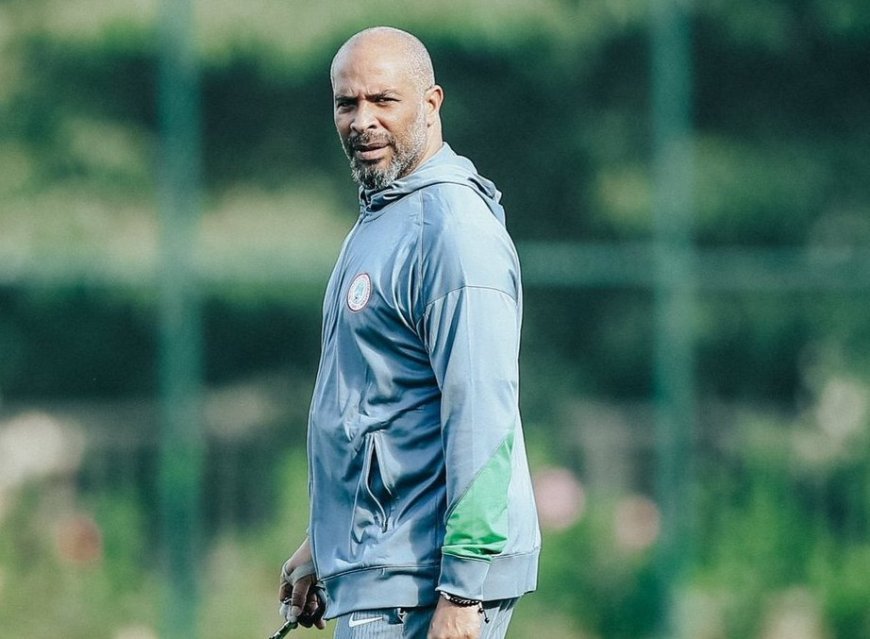Chelle issues Eagles rallying cry as World Cup dreams slip

was only the second time since Nigeria’s first appearance in the tournament in 1994 that the Super Eagles failed to qualify for a World Cup when they missed the 2022 tournament in Qatar after losing to Ghana on away goals. Now, the three-time African champions face the unprecedented prospect of missing consecutive World Cups for the first time in their history, PETER AKINBO writes
South Africa held Nigeria to a frustrating stalemate at the Free State Stadium in Bloemfontein, with the Bafana Bafana taking the lead midway through the first half via a William Troost-Ekong own-goal, before Calvin Bassey restored parity with a header just before halftime.
The result leaves the Super Eagles’ World Cup hopes in tatters, sitting six points behind South Africa with just two games remaining in their qualifying campaign. For a nation that has graced six World Cup finals since their debut in USA 1994, the prospect of watching a second consecutive tournament from home represents an unthinkable catastrophe.
The result leaves the Super Eagles in third position in Group C with 11 points from eight games, level on points with Rwanda but ahead only on goal difference. South Africa top the standings with 17 points, while Benin Republic occupy the crucial second position with 14 points.
The mathematics are now brutally simple for Nigeria: they must win their remaining two fixtures against Lesotho and Benin, whilst hoping South Africa falter in their final games. Anything less will condemn the Eagles to watching the 2026 World Cup from home, marking an unprecedented low in the country’s football history.
Speaking after the devastating draw, head coach Chelle remained defiant despite the precarious position his team now finds themselves in.
“My players are professionals and I know they will still want to win the remaining two games,” the Malian said.
A lot can happen over the next one month. But before that, we will have to analyse our performance tonight, which will not be easy.”
The Super Eagles’ current predicament represents a dramatic fall from grace for a nation that has been a regular fixture at FIFA’s showpiece event. Nigeria have been to six FIFA World Cup finals but missed out on the most recent tournament in Qatar in 2022 after losing to Ghana on away goals in a playoff that remains one of the most painful defeats in the country’s football history.
That defeat marked only the second time since its first appearance in the tournament in 1994 that the Super Eagles failed to qualify for a World Cup, with their previous absence coming in 2006.
Now, the very real possibility of consecutive World Cup absences looms large – a scenario that would have been unthinkable just a few years ago when Nigeria was considered among Africa’s most consistent World Cup participants.
The Eagles’ road to this crisis has been marked by a series of costly slip-ups throughout the qualifying campaign.
Nigeria did not lose the World Cup ticket in Bloemfontein. They lost it when they drew at home to Lesotho. They lost it when they drew away to Zimbabwe at a neutral venue. They lost it when they allowed a last-minute goal at home against Zimbabwe to tie 1-1, according to analysis from ESPN.
The campaign has been characterised by inconsistency, with the team failing to win any of their first four matches, including home draws with Lesotho, South Africa and Zimbabwe, before managing to scrape out victories to climb to their current third position.
While elsewhere in Group C, other results on Matchday 8 further complicated Nigeria’s position. Benin Republic produced a commanding 4-0 victory over Lesotho in Abidjan, to move the Cheetahs to 14 points.
Rwanda also secured a crucial 1-0 win against Zimbabwe in Harare. The Amavubi’s victory means they are now level on points with Nigeria, setting up an intense battle for the remaining spots in the group.
The Super Eagles’ path to redemption is narrow, demanding nothing less than absolute perfection, starting with an immediate and decisive response to their previous failures, as they prepare for their final two qualifiers in October.
South Africa, sitting comfortably on 17 points, are firmly in control of the group and need just one more win from their remaining fixtures to seal their World Cup ticket. The Bafana Bafana have exceeded expectations in this qualifying cycle and appear destined for their first World Cup appearance since 2010, when they hosted the tournament.
For Nigeria, the upcoming clash with Benin Republic now looms as a do-or-die battle that could define whether the country will book a ticket to the United States, Canada, and Mexico in 2026—or be forced to watch from home for a second consecutive tournament.
The Super Eagles will conclude their qualifying campaign in October with fixtures against Lesotho (home) and Benin Republic (away). While victory against Lesotho appears achievable on paper, the away fixture against Benin represents a potential banana skin that could determine Nigeria’s World Cup fate.
The prospect of missing back-to-back World Cups would represent not just a sporting catastrophe for Nigeria, but a significant blow to the country’s football development and international standing. It would also deny a new generation of talented Nigerian players the opportunity to showcase their skills on football’s biggest stage.
The coming weeks will determine whether the Eagles can soar once more or remain grounded for another four years, watching as the world’s greatest football festival passes them by for the second time in succession

 admin
admin 


